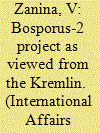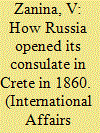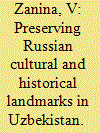| Srl | Item |
| 1 |
ID:
137318


|
|
|
|
|
| Summary/Abstract |
BOSPORUS' TRAFFIC will be reduced to zero," Prime Minister Recep Tayyip Erdogan of Turkey stated in April 2011 as he spoke to a thousands-strong Turkish audience, suggesting as an alternative to the current Bosporus a new "grandiose project," the Bosporus-2 (the official name being Kanal Istanbul).1 Raised in the run-up to the parliamentary elections, the question of the construction of the channel immediately after the victory of the ruling Justice and Development Party (AKP) risked being forgotten. However, from statements of the Turkish government ahead of the presidential election in August this year it became clear that work on the project continues and practical steps are already underway for its implementation.2 With some skepticism, however, Erdogan's plan upset the Turkish and world community over the issue of the legal status of the new strait and unnecessary fuss around the Straits of Bosporus and the Dardanelles.
|
|
|
|
|
|
|
|
|
|
|
|
|
|
|
|
| 2 |
ID:
191043


|
|
|
|
|
| Summary/Abstract |
RUSSIA has done a lot to help Greece become an independent state, providing decisive and freely given aid to the people of Greece to save Greek lives and protect Greek interests over the centuries. This is a fact of history. Russian diplomats who served in the Greek provinces of the Ottoman Empire spared no effort to support and encourage Orthodox Christian Greeks. These diplomats did so not only in their line of duty but out of their own convictions and sympathy toward coreligionists. The work of the Russian consulate that opened in Crete in 1860 is one the best examples of the above. Russian diplomats saved Cretan Christians from extermination, prevented their conversion to Catholicism, and thus preserved the canons of Orthodoxy in Crete...
|
|
|
|
|
|
|
|
|
|
|
|
|
|
|
|
| 3 |
ID:
185041


|
|
|
|
|
| Summary/Abstract |
UZBEKISTAN is a country with its own rich traditions, history, and culture that are closely intertwined with Russia's. The Russian Empire began to move into the region and develop it in the 1860s, and evidence of a common history still exists in various parts of the country. There have been some controversial issues in our relations that are connected, in the opinion of certain Uzbek scholars, to the Russian conquest of Tashkent and other regions and their subsequent incorporation into the Russian Empire. A biased approach toward the common past with Russia and attempts to reject it were especially pronounced during the presidency of Islam Karimov after Uzbekistan gained independence in 1991. The "big brother" policy that Moscow continued to pursue with respect to former Soviet republics and their leaders may have had something to do with that. The personal motives of Uzbekistan's first president and his entourage may also have been a factor.
|
|
|
|
|
|
|
|
|
|
|
|
|
|
|
|
| 4 |
ID:
162820


|
|
|
|
|
| Summary/Abstract |
PRESERVATION of historical and cultural heritage of Russia outside its borders is one of its foreign policy priorities. Much is being done to recover historical facts related to Russia's diplomatic presence in different countries all over the world; historical plaques have been already installed in Naples, Istanbul and Jerusalem to commemorate Russia's diplomatic service.
|
|
|
|
|
|
|
|
|
|
|
|
|
|
|
|